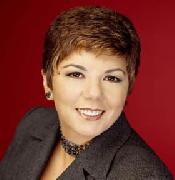CNN’s firing of Senior Middle East News Editor Octavia Nasr has prompted an outcry from Arab-Americans, angry about what they see as a double standard when it comes to coverage of the Middle East in the American media.

|
| Octavia Nasr |
The Anti-Defamation League, which commended CNN’s decision, had described Fadlallah in a letter to the network as someone who had been “designated by the U.S. Department of Treasury as a specially designated terrorist, [who] disseminated numerous fatwas supporting terrorist operations and was a vocal supporter of terrorism against Israeli targets.” It said that CNN should “take steps to ensure that its journalists and editors understand that making known their personal views by tweeting or other methods is out of bounds.”
CNN released a statement on Tuesday saying “it was an error of judgment for Octavia Nasr to write such a simplistic tweet,” adding that “it did not meet CNN’s editorial standards.” On Wednesday, she was fired.
The firing prompted a chorus of applause from conservatives on the Internet. Newsbusters’ publisher Brent Bozell called it a “step in the right direction.” Meanwhile, there was disgust from liberal voices such as Salon’s Glenn Greenwald and much handwringing from tweeting journalists, mulling the possibility of career death from a single tweet.
Marc Lynch, an associate professor of political science and international affairs at George Washington University and a blogger at Foreign Policy’s website, tweeted: “I’d threaten to stop watching CNN if I ever watched CNN, but sadly CNN’s programming put an end to that long ago.” His colleague at FP, Harvard professor Stephen Walt, called CNN’s decision “spineless.”
But the firing provoked perhaps the strongest reaction from Arab-Americans.
“This is unbelievable what is happening in the United States of America,” said Osama Siblani, publisher of the Arab American News. “You can say anything you want — except when it comes to Israel.”
He accused CNN of a double standard, citing what he said was CNN host Wolf Blitzer’s history of working for the Jerusalem Post and for the American Israel Public Affairs Committee (AIPAC). “But for Octavia Nasr to make a statement that’s in agreement with millions of people around the world, has become a firing offense at CNN. It’s incredible the level we have sunk to.”
Siblani, who emigrated to the U.S. from southern Lebanon three decades ago, said Fadlallah was regarded as a “progressive Muslim around the world,” adding, “I respect him. Let them come put me in jail. I plead guilty to this crime.”
Dr. James Zogby, the president of the Arab American Institute, said the very public nature of Nasr’s firing was unwise for a network attempting to build a global audience.
“On the face of it, it doesn’t feel right,” he said. “And it’s going to create a deeper sense of aggravation in the community that says Middle East stories just don’t get a fair shake.”
He said Nasr was often the lone “voice of reason” at CNN during times of crisis in the Middle East, and her firing would send a message to Arabs around the world that their viewpoint doesn’t matter. While there is a diversity of opinion among Arabs about Fadlallah himself, the important thing for CNN is to show that it is big enough to accommodate
In so doing, it adds one more grievance to a long list of AAI’s complaint about CNN’s coverage of the Middle East, particularly on CNN/US. “Their treatment in 2006 of the war on Lebanon was shameful, and their coverage of Gaza was as well. This is an old beef we have with the networks,” Zogby said.
Nasr was born and educated in Beirut, and began her journalism career in 1985 as an assistant news director at Lebanese Broadcasting Corporation (LBC), moving up to cover the Lebanese civil war as a war correspondent. She joined CNN in 1990 as an editor on the international desk, coordinating coverage of the first Gulf war.
She rose through the ranks of CNN, anchoring the CNN World Report and CNN International’s World News from 1993 to 2003. After the terrorist attacks of Sept.11, 2001, she spent months travelling the Middle East coordinating with on-air contributors. She also covered the 2006 war between Israel and Hezbollah.
Most recently, she served as an editor based in Atlanta covering politics and global affairs. According to her official CNN biography, “Her weekly Mideast Voices segment and her blogs offer a glimpse into the region rarely discussed on U.S. television.”
While Nasr covered many of the highest-profile stories in the Middle East, she was far from the only Arab voice on the network. Others, according to CNN, include Hala Gorani, who anchors the 1 p.m. edition of the International Desk from Atlanta; Arwa Damon, CNN’s Jakara-based correspondent; Mohammed Jamjoom, an International Desk assignment editor and producer who often files from Saudi Arabia; and Rima Maktabi, host of CNN International’s “Inside the Middle East.”






Leave a Reply